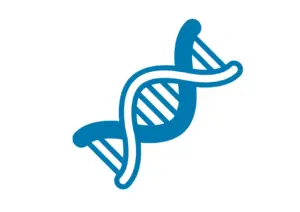
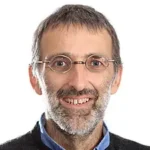
Guex Nicolas
Head, Bioinformatics Competence Center
021 69 24 037
Bio
Nicolas has been developing and optimizing computer algorithms since 1979. He studied plant biology and biochemistry at the University of Lausanne. In the early nineties, during the course of his PhD, he pioneered the use of molecular biology in the Institute of Plant Biology, isolated and sequenced two genes of the glyoxylate cycle, built a molecular model for one of them and initiated the development of Swiss-PdbViewer. He obtained his PhD in 1995 and joined the group of Manuel Peitsch at GlaxoWellcome, where he contributed to the development of Swiss-Model. From 1996-2002, he also taught postgraduate Structural Biology courses at the University of Geneva, EPFL and for the Swiss Institute of Bioinformatics.
During his 12 years at GlaxoSmithKline, he held positions of increasing responsibilities, led a group specialized in Evolutionary and Structural Bioinformatics and contributed to several drug discovery research programs.
In 2008, Nicolas joined the SIB Vital-IT group, headed by Ioannis Xenarios, where he used his bioinformatics and biology expertise to support a wide range of research projects and developed specialized software to support projects that required high performance computing.
In June 2019 he has been recruited to head the newly created Bioinformatics Competence Center of the University of Lausanne.

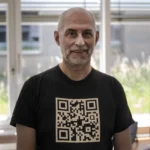
Iseli Christian
Co-Head, Bioinformatics Competence Center
021 693 7536
Bio
Christian obtained a CFC (professional certificate) in agriculture followed by a Master degree in computer engineering from EPFL and Carnegie Mellon University. He then gained a Ph.D. from EPFL with focus on a high performance reconfigurable processor, using Field Programmable Gate Array (FPGA), and its software development environment. He started his professional career with activities in both academia (Systems Manager at ISREC) and industry (software developer at Xemics SA). In 1998, he joined the Ludwig Institute for Cancer Research (LICR) as Systems Manager at the Office of Information Technology, headed by Victor Jongeneel, and subsequently as Assistant Investigator in the Computational Genomics group, also headed by Victor, and finally, as project manager for the Melanoma sequencing project at the LICR.
In 2011, Christian joined the Vital-IT Group, headed by Ioannis Xenarios, as Senior Scientist, where he used his bioinformatics and computer/software engineering expertise to support a wide range of research projects. He also developed specialized software to enable projects requiring high performance computing.
In June 2019, he was recruited to co-head, together with Nicolas Guex, the newly created Bioinformatics Competence Centre of the University of Lausanne.
Technical expertise
Network administration, Relational databases, Software packaging, Storage administration, Systems administration
Analytical expertise
Genomics, Sequence analysis, Transcriptomics analysis
Biological expertise
Canceromics, Clinical bioinformatics

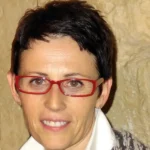
Ambrosini Giovanna
Scientist
Bio
Giovanna received a PhD in Physics from the University of Pavia, Italy, in 1995, and did postdoctoral work at the European Organisation for Nuclear Research (CERN), Geneva, Switzerland.
In 2002, she joined the Computational Biology group headed by Dr.Philipp Bucher at the Swiss Institute for Experimental Cancer Research, Lausanne, Switzerland, as a Bioinformatician and Software Developer in the field of genome sequence analysis.
In 2008, the group moved to the Swiss Federal Institute of Technology in Lausanne (EPFL) and became part of the newly founded Faculty of Life Sciences.
During her 18 years in the Computational Biology Research group, she developed several algorithms and web resources for the analysis of genome sequencing data (e.g. motif analysis) and data generated by recent high-throughput technologies (e.g. ChIP-seq, HT-SELEX, SMiLE-seq and SNP annotation).
In addition, she has been involved in teaching as a lab assistant for Bioinformatics I and Topics in Bioinformatics I at EPFL and in organising regular meetings or community events (the Computational Journal Club and the Functional Genomics Meeting).
She currently works as a Senior Bioinformatician at the Bioinformatics Competence Centre (BICC) of EPFL and the University of Lausanne, which she joined in June 2020.
Her main tasks are the analysis and management of cancer genome sequencing data (ChIP-seq, ATAC-seq, RNA-seq, scRNA-seq, and exome sequencing) and other types of data, statistical consulting and supervision of data analysis pipelines


Brümmer Anneke
Scientist
Bio
Anneke obtained a bachelor’s degree in geophysics and a master’s in physics in Germany. During her master’s thesis at the Max-Planck Units for Structural Molecular Biology in Hamburg and a subsequent internship at the Institute de Biologie Structurale (IBS) in Grenoble she analyzed data from protein x-ray crystallography and cryo-electron microscopy of viruses. She pursued a Ph.D. at the Humboldt University of Berlin and the German Cancer Research Center (DKFZ) in Heidelberg studying theoretical systems biology and mathematical modelling of biological processes, specifically the initiation of DNA replication. During three post-doctoral stays at the Universities of Basel, Los Angeles (UCLA) and Lausanne, between 2010 and 2023, Anneke gained experience in bioinformatics analyses of diverse high-throughput sequencing data, focusing her research on gene regulation acting at the level of RNA, such as by miRNAs, RNA binding-proteins, RNA structure, A-to-I editing, or codon usage. She also performed large, population-scale genetic and transcriptomic analyses using data from human cohorts to reveal insights about transcriptional and post-transcriptional gene regulatory processes and their relation with human complex traits. Anneke enjoys collaborating with experimental scientists and joined the team of the Bioinformatics Competence Centre (BICC) in 2023.


Burns Allison
Scientist
Links
Bio
Allison earned her bachelor’s degree in Biology from the University of Oregon in 2012. During her undergraduate studies, she researched the genetics of circadian rhythms in mosquitoes, sparking her interest in genetics.
This led her to pursue a Master’s degree in Bioinformatics at the University of Oregon. For her Master’s thesis, Allison joined Peter Baumann’s lab at the Stowers Institute for Medical Research in Kansas City, where she analyzed data from various RNA biology projects investigating the mechanisms of telomerase RNA processing. While her work there deepened her interest in data analysis, she also realized her desire to better understand experimental design and data acquisition.
To achieve this, Allison transitioned into a PhD in neuroscience in 2016, joining the Lab of Neuroepigenetics at the EPFL under the supervision of Johannes Gräff. During her PhD, she focused on the genetics of memory formation, conducting both experiments and the analysis of RNA-seq, ChIP-seq, and single-cell datasets. In addition to her research, she fulfilled teaching requirements and took courses in teaching and curriculum development.
Since 2022, Allison has been a member of the Bioinformatics Competence Center (BICC). She collaborates on a wide range of projects with labs at both EPFL and UNIL, specializing in RNA (bulk, single-cell, RIP-seq, etc.) and genome (ChIP-seq, ATAC-seq, scATAC-seq) sequencing. Alongside analysis, she is involved in teaching genomic analysis at EPFL.

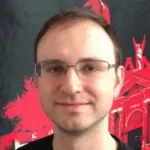
David Fabrice
Scientist
Links
Bio
Fabrice has an academic background in biochemistry and molecular biology. After earning a bachelor’s degree in biochemistry from Université Claude Bernard Lyon 1, he completed a master’s degree in Bioinformatics (DEA Plurifacultaire de Bioinformatique, hosted by UniGe and UNIL). He later obtained a PhD in Bioinformatics from the University of Geneva, spending four years with the SwissProt group. His research focused on the integration between the Protein Structure Database and UniProt, leading to improved semi-automated procedures for transferring knowledge about ligand binding sites and other structural features from 3D structures into UniProtKB/SwissProt.
Following his PhD, he undertook a postdoctoral position at the Bioinformatics and Biostatistics Core Facility (BBCF). During this time, he developed an automated analysis pipeline for mass spectrometry data for the LipidX project and contributed to the creation of in-house genomic analysis solutions, such as HTSstation.
In 2020, he joined the BICC at EPFL as a scientific collaborator. There, he continued existing projects and initiated new ones. Over the years, he has collaborated with various groups at EPFL and UNIL to deliver effective solutions for scientific and data management challenges. His work has primarily relied on Ruby on Rails, a robust and modern framework for web application development.
His publicly accessible achievements include databases such as SwissPalm (swisspalm.org), DGRPool (dgrpool.epfl.ch), and the latest version of Mycobrowser (mycobrowser.epfl.ch); single-cell and bulk transcriptomics tools, such as ClockProfile (clockprofile.epfl.ch), SPICA (spica.unil.ch), and ASAP (asap.epfl.ch); and data management platforms such as PCFpro (pcfpro.epfl.ch).


Dorier Julien
Scientist
Bio
Julien studied theoretical physics at the University of Lausanne and obtained his diploma from EPFL in 2004, followed by a PhD in 2008 in the field of quantum magnetism at EPFL.
He then moved to the University of Lausanne in the group of Andrzej Stasiak to study the 3D organization of DNA and chromatin in cell nuclei using Metropolis Monte Carlo and molecular dynamics.
In 2011 he joined the Vital-IT group of the SIB Swiss Institute of Bioinformatics as a Roche Postdoc Fellow to work on logical modeling of gene regulatory networks.
From 2014 to 2020 he worked as computational biologist at Vital-IT. During this period, he was involved in several projects. In the context of a joint systemsX.ch project with Roche, he continued to work on logical modeling of gene regulatory networks. With the group of Andrzej Stasiak, he worked on the 3D organization of DNA and chromatin and applied knot theory to the analysis of protein structure. He also gained experience in flow and mass cytometry data analysis, as well as Hi-C chromosome conformation capture data analysis.
In 2020, Julien joined the Bioinformatics Competence Center (BICC) where he further developed and broadened his bioinformatics expertise, particularly in Hi-C, Micro-C, ChIP-seq, flow/mass cytometry and biological image analysis.


Götz Lou
Scientist
Links
Bio
Lou obtained a bachelor’s degree in computer science and mathematics, with biology option at the University of Aix-Marseille in France in 2011, followed by a Master in Proteomics and Bioinformatics in Geneva. She did her master thesis on the Proteome Informatics Group of the SIB Swiss Institute of Bioinformatics, led by Frédérique Lisacek, building a tool simulating the action of enzymes on glycan. She joined Vital-IT group of the SIB on 2014 as web developer, working on different kinds of projects, mixing data visualization, data management, database and web application, such as SourceData, an EMBO initiated project to create a novel platform for researchers and publishers to make their papers discoverable based on their data content or OncoBench, a cancer diagnostics platform for the University Hospital of Geneva (HUG) designed to enhance cancer diagnosis by integrating advanced bioinformatics tools and technologies.
Since 2019, Lou has been working in the BICC team as a part-time employee to co-develop the Bixplorer web application to mine transcriptomics and proteomics datasets and a knowledge management system for the oncology department of the CHUV (George Coukos).


Jan Maxime
Scientist
Bio
Maxime has a background in biology, and obtained his PhD in bioinformatics in 2018 with the Swiss Insitute of Bioinformatics (SIB). His doctoral research focused on mouse systems genetics, multi-omics data integration and gene prioritization. During his PhD, Maxime also contributed to enhance data accessiblity and reproducibiliy of analytical pipelines for large multi-omics datasets, adhering to the FAIR principles.
In 2018, Maxime joined the group of Paul Franken at the Center of Integrative Genomics (CIG) as specialist in informatics and statistical methods. Later he moved to postdoctoral research on sleep regulation. During this time Maxime worked on the genetics of sleep and time-course datasets, conducting analyses of chromatine accessibility (ATAC-seq) dynamics and protein dynamics analyses in PER2::LUCIFERASE knock-in mice. His work included modeling gene expression dynamics in mouse and human to disentangle circadian and sleep-wake contribution, which was awarded for best Basic Sleep Research in 2024 by the Swiss Society for Sleep Research, Sleep Medicine and Chronobiology (SSSSC).
In 2021, Maxime joined the Bioinformatics Competence Center (BICC) of the University of Lausanne and EPFL. His role involves analyzing metabolomic, transcriptomic and (phospho-) proteomic data, as well as working on Genome Wide Association Studies (GWAS) in collaboration with departements of the Centre Hospitalier Universitaire Vaudois (CHUV). Additionally, he contributes to teaching RNA-seq analyses to PhD students.


Leleu Marion
Scientist
Bio
Marion has a background in Mathematics & computer science and obtained her PhD in data mining in 2004, completed jointly between academia (INSA in Lyon, France) and industry (CDC, a financial company, in Paris, France).
During this time, she became interested in biological data and leveraged its repetitive structure to develop a more efficient mining algorithm for finding patterns in both financial and biological sequential data.
She began her professional career as a bioinformatician and computer scientist at a Genomics Laboratory in London where she gained experience with gene expression arrays and the statistical analysis of genomics data. She then broaden her focus to epigenetics and other regulatory mechanisms by joining the Epigenetics Development and Cancer Department at the MRC in London, where she collaborated with leading researchers and worked with cutting-edge high-throughput sequencing technologies, contributing to several high-impact publications.
With a wealth of experience, Marion joined the Bioinformatics & Biostatistics Core Facility at EPFL in 2009, and later moved to the BIƆC in 2020, providing advanced and personalised support and consulting to the scientific communities of EPFL, UNIL, and other institutions.
Her main areas of interest and expertise include but are not limited to, genomics, transcriptomics and epigenetics, with a strong interest in integrating multiple modalities, and choosing the appropriate statistical models, to gain a comprehensive understanding of complex biological questions.
She has extensive experience in multi-omics analysis (scRNA-seq, scATAC-seq, Spatial-omics, SPLIT-seq, Ribo-seq), epigenetics and chromatin conformation studies ( 4C-seq,, Hi-C, capture Hi-C, Drop-seq, ChIA-PET, ChIP-seq, DNAseq-seq, etc.), as well as in genomics and metagenomics analysis (WGS, Exome-seq, 16S rRNA-seq, etc.).
Marion also assists with experimental design and participates to the development of specialised computational analysis pipelines.


Liechti Robin
Scientist
Bio
Dr Robin Liechti studied plant biology and bioinformatics at the University of Lausanne, where he obtained his PhD in 2005 on signaling pathways leading to plant defense by combining gene expression, proteomics and bioinformatics analyses. Since 2006 he has been working in the Vital-IT group of the SIB Swiss Institute of Binformatics where his expertise in scientific data visualization, data management, database and web application development has been used in several research projects, like IMIDIA and Rhapsody from the Innovative Medicines Initiative (IMI) of the European Union, Openfludb, a database to share Influenza genetic and epidemiological data or SourceData, an EMBO initiated project to create a novel platform for researchers and publishers to make their papers discoverable based on their data content. Since 2019, he has been developing and managing the knowledge management system for the IMMUcan project (IMI), aiming to characterize the tumor microenvironment of more than 2’600 cancer patients. He is also a member of the project coordination team of this project led by EORTC, SIB, Merck and Bayer. Since 2019, Robin has been working in the BICC team as a part-time employee to co-develop the Bixplorer web application to mine transcriptomics and proteomics datasets and a knowledge management system for the oncology department of the CHUV (George Coukos).


Masson Antoine
Scientist
Links
Bio
Antoine Masson obtained a Ph.D. in Physics from Paris Orsay in 2011.
His academic trajectory includes postdoctoral research at the École Polytechnique Fédérale de Lausanne (EPFL) in the group of Thomas Rizzo (2011–2015), where he specialized in advanced spectroscopic techniques and data analysis. He subsequently joined the Lawrence Berkeley National Laboratory (LBNL) in Berkeley, California, as a postdoctoral researcher in the group of Hoy-Ying Holman (2015–2017), focusing on analytical methods applied to complex biological systems.
From 2018 to 2021, he served as a Data Specialist at EPFL, providing computational support for various scientific projects, with a particular emphasis on data processing and analysis workflows. Between 2021 and 2022, he held the position of Lab Manager Engineer at the Laboratory of Intelligent Systems (LIS) at EPFL, overseeing the technical infrastructure and supporting research activities.
Since 2023, Antoine Masson has been affiliated with the Bioinformatics Competence Center (BICC) at EPFL, where he is involved in the development and implementation of computational solutions for bioinformatics research. His technical expertise encompasses the development of tailored software solutions for research laboratories, web application programming, and deployment of applications. He has extensive experience with technologies such as Python, Javascript (Vue), Database conception, WordPress, and Docker, applying them to support research needs efficiently. His interdisciplinary background in physics and computational science enables him to address complex scientific challenges through a methodological and analytical approach.
